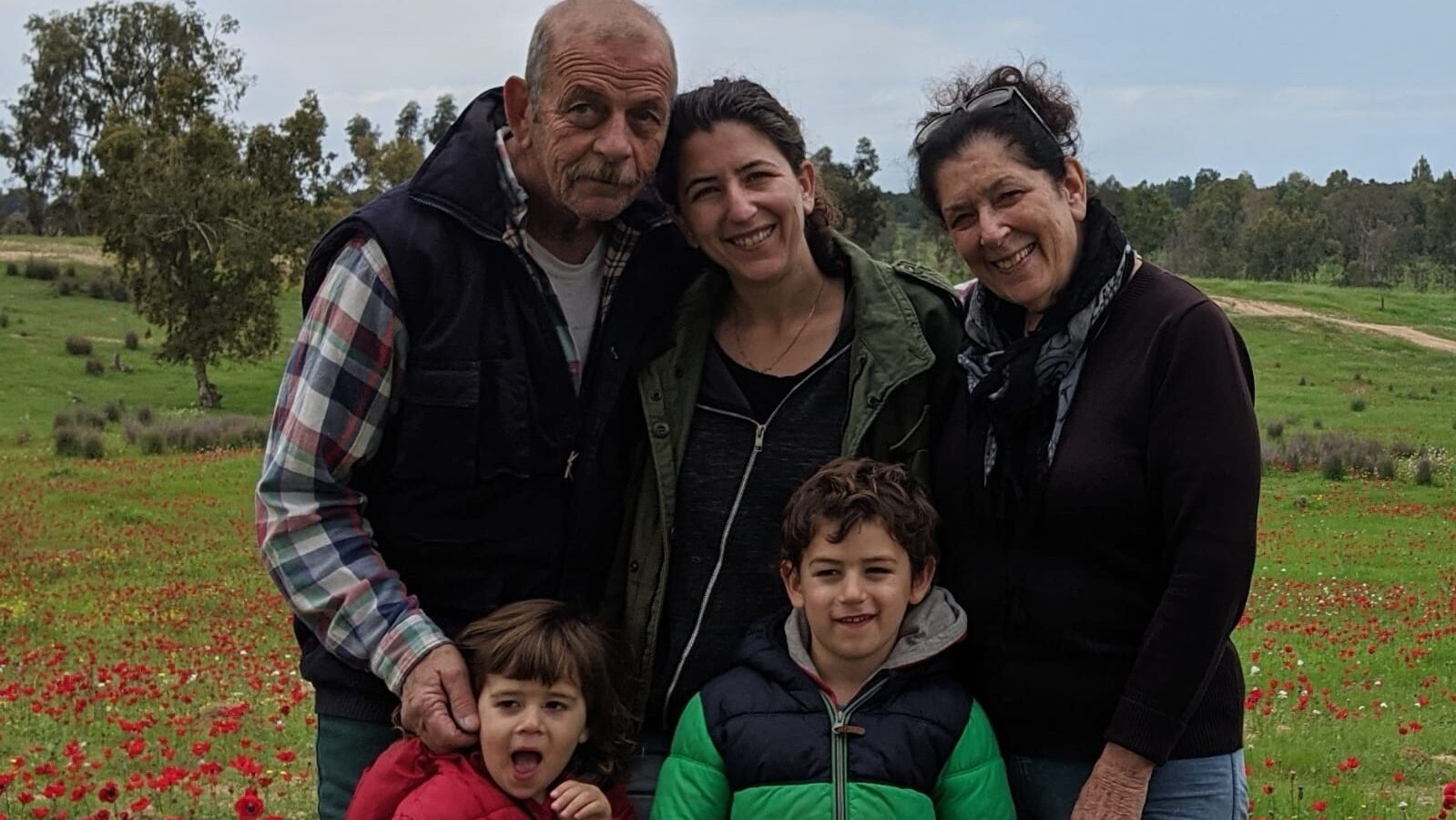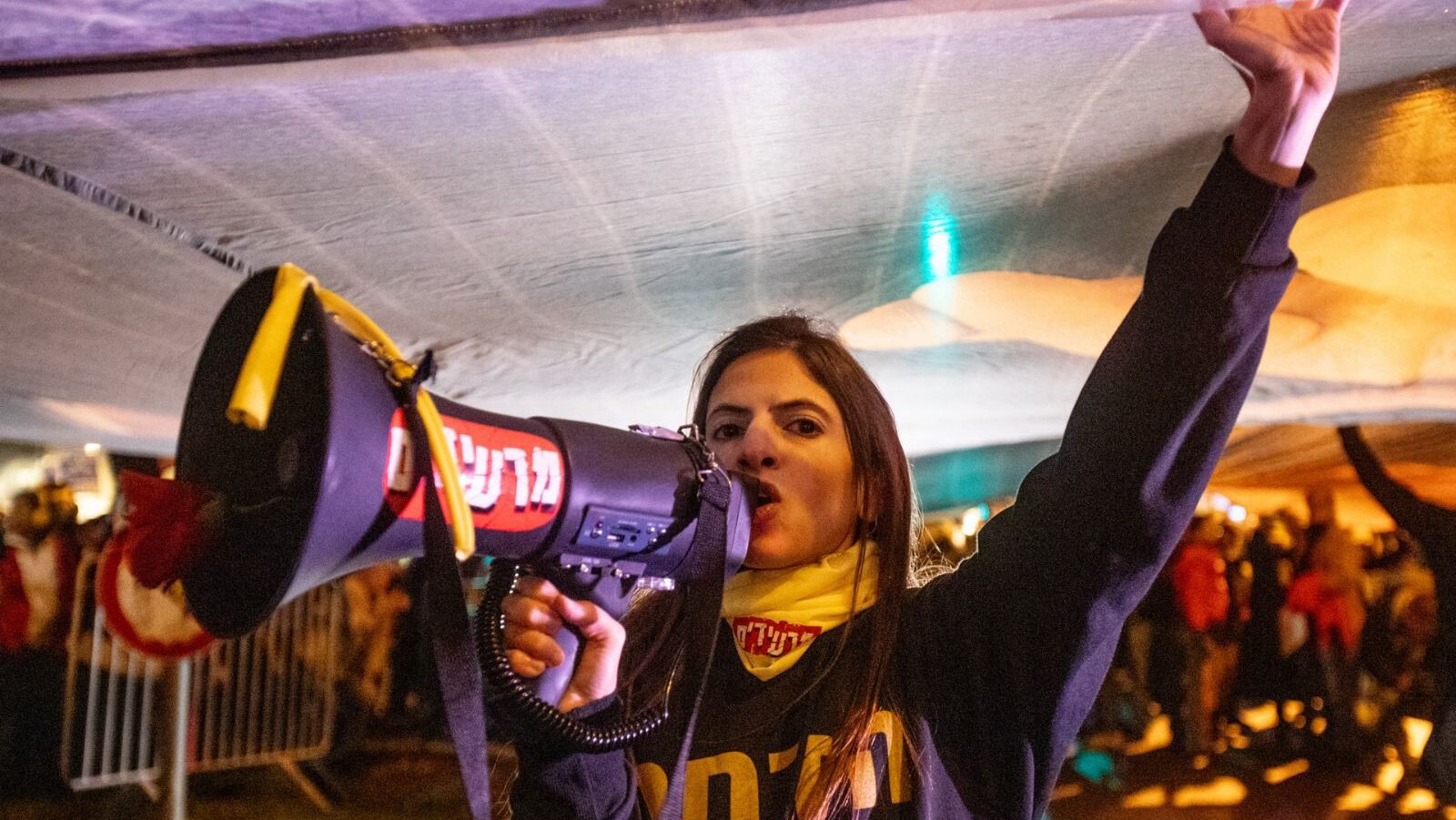Israeli Hostage Families Split on Joining Anti-Government Protests
Nationwide protests in Israel bring together anti-government demonstrators and hostage families as they call for immediate elections and the release of captives in Gaza, showcasing a strong, unified message for action and solidarity
Tens of thousands of protestors filled Israel’s streets on Sunday, demanding immediate elections and urging the government to swiftly negotiate the release of the over 100 hostages still held by Hamas in Gaza. Several families of hostages participated in the broader anti-government demonstrations that have obstructed Tel Aviv’s primary highway, signaling the convergence of some of Israel’s most significant but, until now, separate movements.
Nava Rozolyo, a prominent leader in the movement to replace Israeli Prime Minister Benjamin Netanyahu’s government, told The Media Line that the group’s central goal predated the events of October 7. “Back then, it was due to Netanyahu’s government plan to weaken the Supreme Court and take it over.”
“Primary issues that the protest movement seeks to address didn’t change over the years; only now have Netanyahu and his government become more dangerous to Israel,” she continued, adding that the Netanyahu government’s legislation to “weaken democracy” hasn’t stopped even after October 7. “They continue with that even today, while Israelis are busy struggling to bring our hostages back home and while most Israelis are serving in the army.”
She emphasized that it is important for the anti-government protestors to support the families in their fight, explaining, “Families didn’t join us. We joined them.”
“We are there to support them and help them fight to bring their loved ones back home because they can’t do that alone. They are in a terrible emotional situation.”
According to Rozolyo, the families know that if they want the release of the hostages, they have to replace the government. “Not all are willing to stand in the front and lead a brave struggle against Netanyahu’s government. We stood there together with them all along the way, even before last Saturday.”
She explained that only 11 families of hostages demanded replacing Netanyahu’s government in order to release the families. Still, she feels like others might express their support through the silence.
“Other families haven’t stood with us in the media briefs, but they didn’t object. So even if they don’t have the courage or the strength to demand the same thing, you can hear from their silence that maybe they understand the same thing, and maybe in a few weeks, they will even say it in their voice,” she told The Media Line.
Still, Rozolyo emphasized that the protesters stand with all of the families, even when they’re not calling specifically to replace Netanyahu’s government. She added, “The broader civil struggle to replace Netanyahu’s government is there to support them.”
As for the hostage families, Noam Perry—daughter of hostage Haim Perry—shared with The Media Line that they are desperate to bring their loved ones home and are ready to use any support they can find.
We’re living a nightmare. We feel like we need to scream it louder.
“On Saturday, we saw the frustration and feelings of the families. They are almost six months into it and have the feeling they must go further and harder,” she said. “We’re living a nightmare. We feel like we need to scream it louder.”

Noam Perry with her father Haim Perry. (Courtesy)
Perry noted that while some families also protest against the government, that’s not the majority. She insists that the families represent all sides of Israeli society, noting: “The fight to bring our loved ones back was and remains unpolitical.”
“Some families have decided to make this a more political fight. But that’s just a few families, and they’re entitled to do this. Each family has its own way. All the families are still part of the forum, and the forum remains unpolitical,” she said.
“It’s just the fight to bring the hostages back. We don’t care about anything else. We’re not left-wing or right-wing. It’s strictly a matter of bringing our loved ones, in my case, my father, back. Just like no one asked my father, ‘Who are you voting for?’ before taking him.”
Perry reiterated that the release of their loved ones is her only priority. “The only thing I fear is my father’s well-being. He’s almost 80 years old. They took him from home. We know they took him alive. They published a video of him still alive in mid-December.”
Despite protestors’ diversity of views, Prof. Tamar Hermann of the Israel Democracy Institute pointed out, “They share a common denominator now: the need for elections as soon as possible.” However, while reflecting on the potential pressure families joining the anti-government protest movement could exert on the government, Hermann admitted uncertainty.
She said that the current government might be detached from street-level developments, especially given the relatively modest scale of the protests thus far. She noted, “We have to pay attention to the homogeneous character of the (anti-government) movement: secular, big cities, highly educated, many women, average age of 50 and above—they were never voters of this government anyway.”
“There was an expectation that after October 7, new sectors would join the anti-government protest, but so far, it hasn’t happened,” she continued. “I don’t think that this might impact the deal about the hostages.”
“The protests are not big enough yet. It should be much, much bigger and more diversified, and it should include some of the government’s base in order to have influence.”
Additionally, Hermann noted that not all the families of hostages joined the protesters. “Certain families decided to make this move as the former activities, which were more consensual, did not bring them far enough in their struggle to bring their loved ones home.”
“In a way, it paints them politically, which was not the case at the beginning. They will be seen as leftists, as part of the anti-government protest,” she explained, adding that some of the families withdrew from joining the protest because they did not want to be associated with it. “This is something that people should know. It is not that the entire group joined forces with the protest.”
She also noted that, according to current assessments, around 60 hostages are thought to be alive, meaning that roughly half of the hostages might unfortunately have perished, which significantly alters the negotiation landscape.
“This is a different kind of negotiation because you’re not going to release major Palestinian figures in return for bodies. The situation gets increasingly complicated with time,” she explained to The Media Line. “Not everyone agreed to the statement ‘Bring them back home at all costs.’ This is something that divides the Israeli public.”
We believe Netanyahu’s government is not willing to pay any price just to see the hostages back home because he depends on his very radical coalition
Rozolyo, however, said she believes that Israel could get a deal with Hamas but that the government doesn’t want to pay the price. “We believe Netanyahu’s government is not willing to pay any price just to see the hostages back home because he depends on his very radical coalition.”
“Maybe he doesn’t have an interest in ending the war.” she continued. “Maybe other considerations lead him. He needs to keep his coalition intact.”
Addressing criticism, Rozolyo claims that those who say that demonstrations during the war might weaken the IDF and harm Israel share an opinion with Netanyahu and his government. “We have to remember that when Netanyahu’s people attacked the head of the IDF—the heads of the military, the entire security system in Israel—that (is what) possibly weakened the national security … way more than demonstrations in Israel.”
For her part, Perry noted, “‘Release at all costs’ is an empty saying. Of course, we can’t make the deal at all costs. But I do believe that the Israeli government should work as hard as they can to bring hostages home.”
“I think it’s doable. Unfortunately, not everything is in our control. We have to deal with Hamas. Hamas is the only one responsible for my father’s release,” she continued.
“But I can’t appeal to them. I can appeal only to my government. And I’m doing it very strongly, and I will continue doing this, but not as a political fight.” She also added that as much as she expects work on the deal from the Israeli government, she also hopes for the help of the United States, Qatar, and Egypt.
Finally, Perry emphasized that the families continue to pressure everyone, including the international community, to achieve the immediate release of their loved ones. She shared with The Media Line, “Just last week, I went to Geneva to the UN Human Rights Council and talked there to the assembly. We’re doing everything that we can, everywhere in the world.”
“We’re focused on releasing the hostages and need the public’s help. Any other movement is welcome to join our fight, but it will remain apolitical.”


